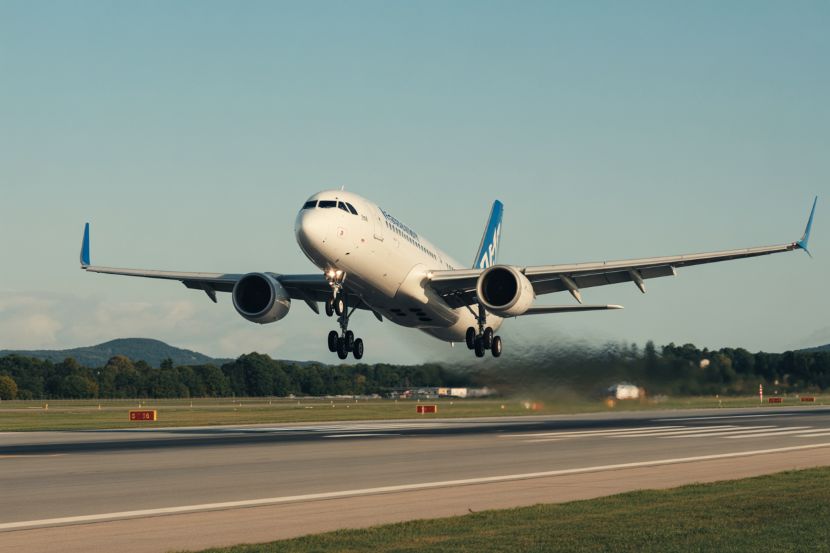Published on
September 28, 2025
The impact of climate change is now being felt in more ways than one, and it’s not just rising temperatures or more frequent extreme weather events that we should worry about. New research reveals that warmer air conditions will make flights louder, especially for people living near major airports. This includes busy travel hubs like Heathrow, Gatwick, and London City Airport. The study, conducted by experts at the University of Reading, highlights how global warming will reduce the altitude of departing aircraft, meaning the roar of jet engines will be more noticeable to those living close to airports. In addition to the noise pollution, the study also suggests that aircraft might face more turbulence, flooding may increase at some airports, and overall safety may be impacted.
Why Will Flights Be Louder Due to Climate Change?
As the Earth’s climate warms, the density of air decreases, which makes it harder for planes to achieve lift. This means that immediately after take-off, planes will not climb as steeply as they normally would. Instead, they will stay closer to the ground longer. As a result, nearby residents will experience louder engine noise for extended periods. The problem will be most pronounced during hot weather, when the air is even less dense. Aircraft flying over populated areas will be noisier than ever, adding a significant level of disruption, especially in cities with high airport traffic like London, Amsterdam, and Zurich.
The research indicates that by 2050, the number of people affected by aircraft noise in Europe could rise by up to 4%. This change is expected to affect residents within a 50-decibel (dB) noise footprint, where the hum of an aircraft becomes particularly disturbing. At present, around 60,000 people in central London already live within this zone, but climate-related changes in both temperature and population density could bring thousands more into this noisy range by mid-century.
Aircraft Noise Could Reach New Levels
In the study, scientists examined the effect of climate change on airports across Europe, including London airports like Heathrow and Gatwick, as well as hubs in Dublin, Brussels, Amsterdam, Lisbon, and Zurich. They specifically looked at the Airbus A320, a popular aircraft used for short European routes, to estimate how its flight path would change due to warmer temperatures.
Experts predict that on average, departing aircraft climb angles could decrease by 1% to 3%. On especially hot days, this could rise to as much as 7.5%, meaning planes would fly even lower. The consequence is increased noise pollution, particularly from low-frequency sounds. These types of sounds, which travel further than higher-pitched noises, are especially intrusive and tend to cause stress, sleep disturbances, and other health problems for people living near airports.
What Does This Mean for Travelers and Residents?
For those living near airports in cities like London, Brussels, or Zurich, this increase in noise will not just be an inconvenience, but a growing health concern. Residents may struggle with the constant hum of jet engines as planes remain closer to the ground for longer periods. The most problematic sounds are those with low frequencies, which are harder to block out and can be psychologically irritating.
While travelers flying in and out of airports will notice no difference in their experience, the surrounding communities are set to bear the brunt of this change. For frequent flyers, this shift may be concerning, especially for those already troubled by air turbulence. However, it’s not all bad news—airlines and aviation authorities can take steps to mitigate the effects of rising temperatures, such as investing in new technology or adopting stricter emissions regulations to slow down the process.
How Can Travelers and Locals Cope with Increased Noise Pollution?
There are several ways travelers and those living near airports can minimize the impact of increased noise:
Use of Noise-Canceling Technology: For frequent flyers, investing in high-quality noise-canceling headphones or earplugs can significantly reduce the noise from planes.Soundproofing Homes: Residents near airports might want to consider soundproofing their homes by installing triple-glazed windows or soundproof doors to block out the noise.Stay Informed: Travelers should stay updated on the impact of climate change on flight conditions, especially turbulence, and prepare accordingly.Reduce Carbon Footprint: Although it’s mainly aviation industries and governments that must act, travelers can reduce their carbon footprint by choosing flights with lower emissions and supporting environmentally conscious airlines.Other Climate Change-Related Aviation Challenges
This study is just one aspect of how climate change is affecting the aviation industry. Rising temperatures also pose a significant risk of increased turbulence. Warming temperatures disrupt the jet stream, causing more unpredictable and dangerous air currents that could make flights bumpier and increase the chances of injury. Additionally, rising sea levels threaten to flood major airports, potentially disrupting travel on a much larger scale.
Looking Ahead: What Needs to Be Done
In the face of these challenges, action must be taken to mitigate the effects of climate change on aviation. Experts emphasize the importance of reducing greenhouse gas emissions to prevent further increases in global temperatures. While new aircraft technology can reduce noise to some extent, addressing climate change head-on will remain the most effective long-term solution. Without such efforts, airports and residents alike will have to adjust to a world where the sounds of aircraft engines are louder, the skies more turbulent, and the overall experience of flying less predictable.
What You Need to KnowIncreasing Aircraft Noise: Flights will get louder due to warmer temperatures affecting aircraft lift and climb angles.Turbulence Threats: More turbulence will likely result from disrupted jet streams, leading to a bumpier flying experience.Noise Pollution: Thousands more people will be affected by noise pollution around major airports in Europe, including Heathrow and Gatwick.
